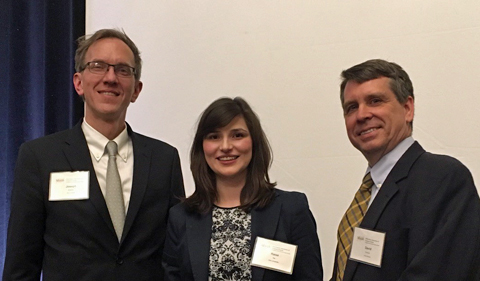
From left, Dr. Joseph Shields, Psychology graduate student A. Raisa Ray, and Dr. David Koonce
Psychology graduate student A. Raisa Ray received the 2017 Midwestern Association of Graduate Schools/Pro Quest Distinguished Master’s Thesis Award at the association’s recognition dinner on April 5 in Indianapolis.
The award recognizes her research on the factors that help or hinder the social functioning of adolescents with Attention Deficit Hyperactivity Disorder (ADHD).
“I heard many positive comments from the audience, and Associate Dean David Koonce and I were very proud to be there to share the occasion with her,” said Dr. Joseph Shields, Vice President for Research & Creative Activity and Dean of the Graduate College. “Her outstanding masters thesis award is strong testimony to Raisa’s ability and accomplishments to date, as well as to the quality of our psychology program; the evening providing great visibility for Ohio University.”
Ray is in the Clinical Child Psychology program at Ohio University. Her adviser is Dr. Steven W. Evans.

Professor of Psychology Steven Evans, left, nominated Ohio University graduate student Raisa Ray, right, for the Distinguished Master’s Thesis Award from the Midwestern Association of Graduate Schools. Photo credit: Ben Siegel, Ohio University.
Evans, Ray’s faculty mentor, nominated her for the award. Evans co-leads the Center for Intervention Research in Schools, which studies how K-12 educators, administrators and school mental health professionals can help children and adolescents with emotional and behavioral problems such as ADHD succeed academically and socially.
For her thesis project, Ray studied 324 middle school youth with ADHD, some of whom had healthy social functioning and others who did not, as rated by the youth and their parents. She found that youth participation in team or individual hobbies, sports or other such activities buffered against the negative effects of risk factors—such as teen conduct problems, youth depressive symptoms and negative parenting—on adolescent social functioning.
This finding is important, Evans noted, as parents can be quick to withdraw children with ADHD from group activities because of the likelihood or fear of behavioral problems and disruption. Ray’s research suggests that it could be beneficial to keep such adolescents involved in social activities.
Parent involvement in and support for adolescent activities—such as driving them to sports practice, expressing interest in adolescents’ plans or helping them pursue hobbies—is another important buffer against negative social outcomes, Ray’s study found. Negative parenting practices such as inconsistent discipline, corporal punishment and limited monitoring/supervision of teen activities and whereabouts, however, were determined to be risk factors for poor social functioning.
“The findings were interesting and informed relevant issues in the field,” Evans said about his decision to nominate Ray’s thesis for the MAGS award. He added that Ray did a good job of blending theories and approaches from various disciplines and also produced a very well-written thesis. The research was published in the high-impact Journal of Abnormal Child Psychology.
Ray, who is one of 16 psychology graduate students currently working with CIRS, stressed the benefits of the center’s writing group, in which students and faculty offer each other feedback on projects such as grant proposals, journal articles and book chapters. She also praised the mentoring and positive environment of the center and the Department of Psychology in the College of Arts & Sciences.
“I feel that this award is not just my award, but it is really a culmination of the great work that we’re able to do here and the very high quality mentorship and guidance that we receive here as graduate students,” she said.
Ray is completing coursework for her doctoral degree during this spring and will begin a clinical internship at Nationwide Children’s Hospital in the fall. She is expected to defend her dissertation and complete the internship in 2018.
The Midwestern Association of Graduate Schools is a regional affiliate of the Council of Graduate Schools. MAGS member colleges and universities are accredited institutions of higher education in the central U.S. that offer graduate programs leading to master’s, specialist, and doctorate degrees.
Thesis Title: Factors Associated with Healthy and Impaired Social Functioning in Middle-School Adolescents with ADHD
Abstract: There is variability in the extent to which adolescents with Attention Deficit Hyperactivity Disorder (ADHD) demonstrate social impairment, as the same diagnosis does not necessarily entail impairment in the same area of functioning. The current study is a cross sectional examination of enhancers to healthy social functioning and risk factors to social impairment in 324 middle school youth (ages 10-14 years) with ADHD, considering both parent and adolescent report of social functioning. A series of binary logistic regression analyses were used to evaluate risk-resilience models for social functioning, including testing compensatory (i.e., main; buffering) and protective (i.e., interaction) effects of enhancers in the presence of risk factors. Youth conduct problems, youth depression and negative parenting emerged as significant risk factors to social impairment. Adolescent self-perceived social acceptance, activity participation (breadth and intensity) and parental involvement acted as enhancers to healthy social functioning. Of these enhancers, activity participation and parental involvement showed buffering effects against the negative impact of the risk factors on social functioning. None of the enhancers displayed protective effects. The findings of this study enhance the knowledge pertaining to social functioning in a group of young adolescents with ADHD, which has been an understudied population relative to younger children with similar problems.


















Comments